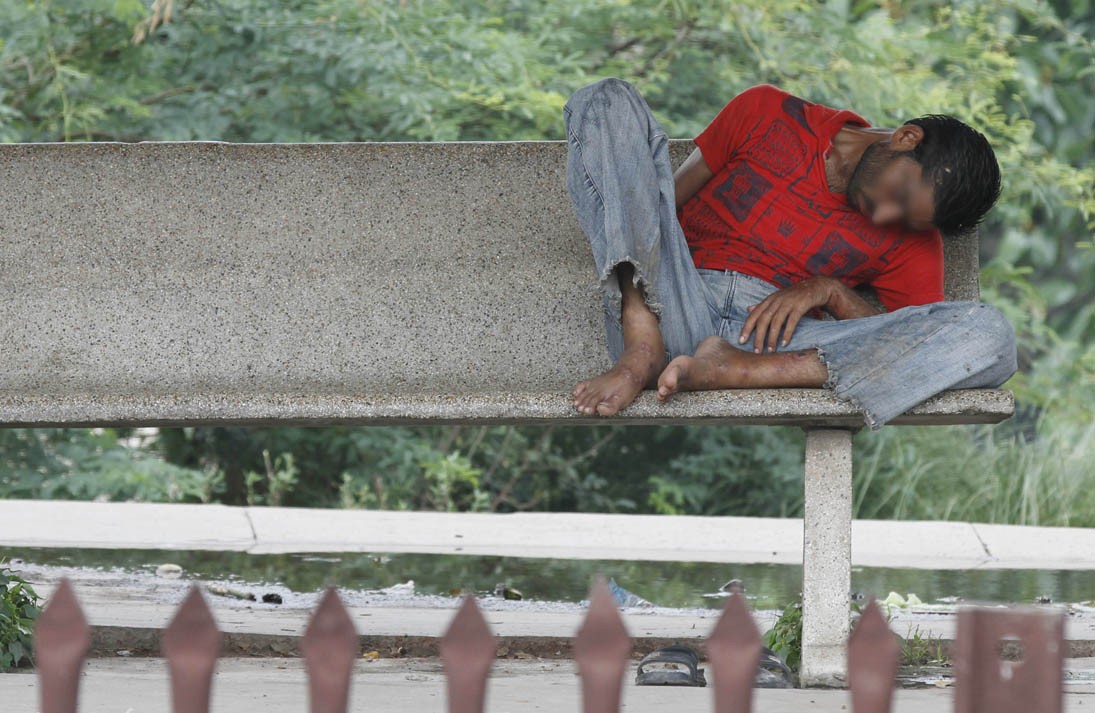
An overwhelming majority report physical or psychological dependence on substance abuse

Driving towards the old city, around Data Darbar, you are sure to spot strange-looking individuals huddled together. Strange, by virtue of their appearance -- their clothes are dirty, almost filthy; and the males among these have wildly grown beards.
One of them is rubbing some powdered material on his palms, while a cigarette is placed precariously between his fingers. This is meant to be sniffed by all, or filled in the cigarettes for a puff.
At other occasions, a syringe comes in handy. Everyone takes turns to inject a specific drug into their bloodstream. These are ‘drug addicts,’ also (sarcastically) dubbed ‘jahaz’ (meaning: aeroplane) because they get a high after they’ve taken a shot.
Those who use syringes are called Injection Drug Users (IDUs). They are the most vulnerable of the lot, as they often contract such deadly diseases as AIDS and hepatitis C.
As the injectible drug is costly, the IDUs pool money and use small portions of the drug, using the same syringe.
This scribe visited the ‘usual’ spots of such drug addicts to find out about their life and why the police and other government authorities do not care about them, who are these people, why do their families not get them treatment, how do the drug sellers target them, and so on.
28-year-old Numan Tariq is one bad victim of narcotics. He started using opium before he got married. Soon his wife came to know about it. Tariq would steal things from his house and sell them in the market in order to buy himself the drug. He even sold some of her gold jewellery. His wife demanded divorce and they went separate ways. Tariq’s father took him to a hospital for treatment but he ran away from there.
"My folks don’t like me," Tariq says. "When I go home, they lock me inside while I am dying to have a dose of chitta powder. They take no pity on me. So I mostly stay out now."
In the absence of a source of income, he’s had to resort to pickpocketing. "I was once caught red-handed and lynched by the mob," he says, showing the bruises on his body.
The "chitta powder" (heroin) costs Rs500 per gram. The urges that Tariq has force him to buy the drug, whatever it takes.
There are addicts who are into beggary. They can be spotted at different parts of the city, chiefly the busy traffic junctions. They are known for stealing manhole lids, side mirrors of cars that are parked away from public eye, and sell them to a kabaria (scrap dealer). They also steal fans and shoes from outside the mosques.
Many people are making a huge profit by selling such drugs at high prices. Allegedly, the police know about their business but do nothing to stop them. The dealers give monthlies (to the police) and carry on with their business.
Akmal Owaisi, Member, Provincial Narcotics Control Committee, Government of Punjab, is of the view that drug addicts commonly have no earning means. They even live in the open air or at graveyards.
"When an addict dies, he is often buried without giving him a proper coffin and funeral," he says. "The police claim that these are unidentified bodies, and do not bother to find their heirs. Some policemen contact Edhi Foundation or some private philanthropists to help in burial [of the drug addicts]."
Drug pushers are an ‘influential’ lot and they get away with it allegedly by bribing the police. Syringes and injectible drugs can be bought from selective medical stores that refuse to give receipts in these cases.
A young man who claims to have left the business, says on condition of anonymity, "We would pay between Rs20,000-50,000 per month to the beat officer of the concerned police station. The rate actually depends on the volume of business. Sometimes we would bootleg wine bottles for the SHO on his private parties."
The man says he sold hashish (aka ‘sheera’) for Rs8,000 per 25 grams. The rate of garda is Rs80,000 per packet.
One major reason why the drug peddlers continue with their business is the support they get. For example, when pressurised, the SHO orders muharirs to lodge an FIR of possession of 250 grams. This much quantity gets them a punishment no stricter than 3 to 6 years in prison. The drug pushers can also be bailed out.
Citing a survey of 150,000 people in Lahore city on drug use, Akmal Owaisi says that around 14 percent of the drug users are women. "This is an alarming fact. And, to think that the number keeps on increasing as rehabilitation is difficult." Owaisi also says that as many as 47 rehabilitation centres are functional in Lahore city. "Seven of them are working under the government while the rest are being run by different NGOs based in Lahore."
Muhammad Arham, SHO, Tibbi City area where the drug addicts are in huge numbers, rejects the notion that drug pushers have their support. "It’s a complete farce. In fact, the Punjab Police provide them funds to bury the dead. We also contact the heirs of the dead before sending the body to the hospital for postmortem."
The dead bodies are kept in morgues and buried after four to six days if the heirs aren’t identified. "We have the records," Arham claims. "Whenever the heirs come, they are given all kind of information including the location of the grave and the cemetery."